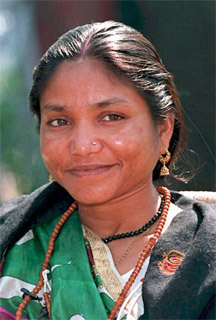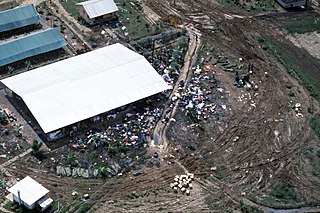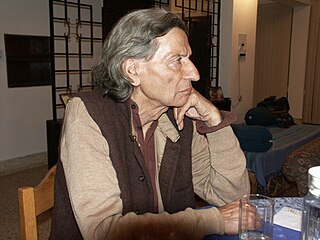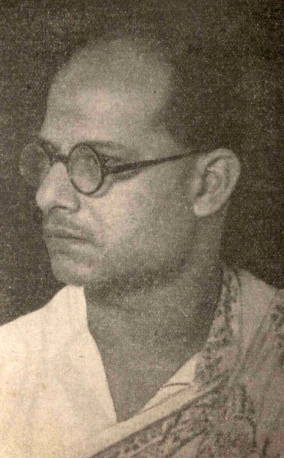Related Research Articles

Phoolan Devi, popularly known as the Bandit Queen, was an Indian dacoit (bandit) who became a politician, serving as a member of parliament until her assassination. She was a woman of the Mallah subcaste who grew up in poverty in a village in the state of Uttar Pradesh, where her family was on the losing side of a land dispute which caused them many problems. After being married off at the age of eleven and being sexually abused by various people, she joined a gang of dacoits. Her gang robbed higher-caste villages and held up trains and vehicles. When she punished her rapists and evaded capture by the authorities, she became a heroine to the Other Backward Classes who saw her as a Robin Hood figure. Phoolan Devi was charged in absentia for the 1981 Behmai massacre, in which twenty Thakur men were killed, allegedly on her command. After this event, the Chief Minister of Uttar Pradesh resigned, and calls to apprehend her were amplified. She surrendered two years later in a carefully negotiated settlement and spent eleven years in Gwalior prison, awaiting trial.

Mass suicide is a form of suicide, occurring when a group of people simultaneously kill themselves. Mass suicide sometimes occurs in religious settings. In war, defeated groups may resort to mass suicide rather than being captured. Suicide pacts are a form of mass suicide that are sometimes planned or carried out by small groups of depressed or hopeless people. Mass suicides have been used as a form of political protest.

Pratibha Ray is an Indian academic and writer of Odia-language novels and stories. For her contribution to the Indian literature, Ray received the Jnanpith Award in 2011. She was awarded the Padma Bhushan in 2022.

Pratibha Devisingh Patil, also known as Pratibha Patil Shekhawat, is an Indian politician and lawyer who served as the 12th president of India from 2007 to 2012. She was the first woman to become the president of India. A member of the Indian National Congress, she also served as the Governor of Rajasthan from 2004 to 2007, and was a member of the Lok Sabha from 1991 to 1996.

Keshav Malik was an Indian poet, art and literary critic, arts scholar, and curator. He remained art critic for the Hindustan Times (1960–1972) and The Times of India (1975–2000). He published eighteen volumes of poetry and edited six anthologies of English translations of Indian poetry.

Asad Ali Khan was an Indian musician who played the plucked string instrument rudra veena. Khan performed in the style dhrupad and was described as the best living rudra veena player in India by The Hindu. He was awarded the Indian civilian honor Padma Bhushan in 2008.

Kunal Singh, known professionally as Kunal, was an Indian actor who worked mainly in Tamil cinema. He is best known for his romantic role in Kathir's Kadhalar Dhinam (1999), which is Kunal's debut film.

Guru Mayadhar Raut is an Indian classical Odissi dancer, choreographer and Guru.

Sapne Suhane Ladakpan Ke is an Indian television series that aired on Zee TV from 21 May 2012 to 23 January 2015. The show focused on celebrating adolescence by portraying the lives of two teenage cousin sisters, Gunjan and Rachana. The teenage years signify the start of a person's youth, and the experiences during this period have lasting effects on personality.

Tirath Das Dogra is an Indian forensic pathologist. He was the pro-chancellor and vice-chancellor of SGT University, Budhera Gurgaon Haryana (2013–2017).
Brij Krishna Chandiwala was an Indian freedom fighter from Delhi and a political associate of Mahatma Gandhi who was awarded the Padma Shri in 1963 for his contributions to the field of social work.

Sanjeev Jha is an Indian politician belonging to the Aam Aadmi Party. He is a member of the Delhi Legislative Assembly (MLA) from Burari Constituency. Sanjeev is also the incharge of Chhattisgarh and Spokesperson of the Aam Aadmi Party.

Devi Prasad Roy Choudhury was an Indian sculptor, painter and educator. He is well known for his monumental bronze sculptures, especially the Triumph of Labour and the Martyrs' Memorial, and is rated by many as one among the major artists of Indian modern art. He worked in a broad spectrum of mediums including watercolors, expressionist landscapes and commissioned portraits. Large scale sculptures were his particular strength and he made social realism the cornerstone of his art. In addition to painting and sculpting, he also wrestled, played the flute, engaged in hunting and wrote short stories in his spare time.

Devi (transl. Goddess) is a 2016 Indian trilingual comedy horror film co-written and directed by A. L. Vijay. It features Tamannaah Bhatia in the title role with Prabhu Deva and Sonu Sood in the lead roles and RJ Balaji, Saptagiri, Rajiv Thakur and Murali Sharma in supporting roles. In addition to Tamil, the film was also simultaneously shot in Telugu and Hindi titled Abhinetri (transl. Actress) and Tutak Tutak Tutiya, respectively.
The Relu Ram Poonia MLA murder case or Poonia murders was a mass murder of the Indian politician Relu Ram Poonia and seven of his family members. The murders were committed by Ram's daughter Sonia, along with her husband Sanjeev Kumar, on the night of 23 August 2001 over a property dispute. The case was filed and Sonia, Sanjeev and various members of his family were tried. The couple were convicted of the murder charges and sentenced to death by the district court. The sentence was reduced to life imprisonment by the Punjab and Haryana High Court but the death sentence was reinstated by the Supreme Court of India. The couple remained in jail during the process when, under the section 72 (1) of the Constitution of India, a mercy petition was raised. The petition went unanswered by then President Pratibha Patil but was rejected by her successor Pranab Mukherjee. However, the couple's death sentence was reverted to life imprisonment after a petition was filed by the civil rights group People’s Union for Democratic Rights (PUDR) citing delays in the disposal of the mercy plea as grounds for clemency, which the Supreme Court accepted in January 2014.

Sasural Simar Ka 2 is an Indian Hindi-language television series that aired from 26 April 2021 to 7 April 2023 on Colors TV. It is a sequel to the 2011 soap opera Sasural Simar Ka. Produced by Rashmi Sharma Telefilms, it stars Radhika Muthukumar, Avinash Mukherjee, Tanya Sharma, Karan Sharma and Jayati Bhatia.

House of Secrets: The Burari Deaths is a 2021 docuseries by Netflix. Created by Leena Yadav and Anubhav Chopra, the three-part series explores the theories surrounding the demise of 11 members of the same family on 30 June 2018. Termed as the Burari deaths by the media, the true-crime docuseries released on 8 October 2021. The series is directed by Leena Yadav and Anubhav Chopra. A. R. Rahman and his ensemble of musician group, Qutub-E-Kripa, composed and produced the score of the docuseries, dialogues by Tyson Newton Fernandez. Yogendra Mogre and Katherine Leblond are the producers while Aseem Bajaj and James Haygood are the executive producers.
Narayani Devi Verma was a freedom fighter from Rajasthan in the Indian independence movement. She was the wife of fellow freedom fighter Manikya Lal Verma and together they fought with colonial, imperialist as well as feudal oppression in the erstwhile princely state of Mewar. She had played a key role in the Bijolia movement and also took many steps to promote women’s education. While she was very active in the Praja Mandal Movement, her commitment to Gandhian ideals resulted in her active efforts towards tribal welfare and Dalit upliftment. Even after independence, she remained active in both politics and social service. She was a Rajya Sabha member from 1970 to 1976. She died on 12 March 1977.

Aakhri Sach is a 2023 Indian Hindi-language crime investigative thriller television series on Disney+ Hotstar, directed by Robbie Grewal. Produced by Nirvikar Films, the series stars Tamannaah Bhatia in the lead role along with Abhishek Banerjee, Shivin Narang, Nikhil Nanda and Rahul Bagga. The series is loosely based on the Burari deaths, with Tamannaah playing the role of the lead investigative officer, Anya.
Burari is a village located in Central district in the Union Territory of Delhi, India. It is located near the border with Uttar Pradesh.
References
- ↑ "CCTV footage shows what happened moments before 11 Burari deaths". India Today. 5 July 2018. Archived from the original on 18 July 2018. Retrieved 18 July 2018.
- 1 2 Bhandari, Hemani (16 July 2018). "Burari deaths: 11 bright people with one dark secret". The Hindu. Archived from the original on 17 July 2018. Retrieved 17 July 2018– via www.thehindu.com.
- ↑ "Burari deaths: Family may have been suffering from 'shared psychosis'". 4 July 2018. Archived from the original on 25 December 2018. Retrieved 6 July 2018.
- ↑ "Burari deaths: CCTV footage reveals more details of suicide plans". 5 July 2018. Archived from the original on 25 December 2018. Retrieved 6 July 2018.
- ↑ "India mystery over Delhi's 'house of mass hangings'". BBC News. 2 July 2018. Retrieved 29 February 2024.
- 1 2 "Occult Angle Suspected After Family Of 11 Found Dead In Delhi Home". Archived from the original on 25 December 2018. Retrieved 6 July 2018.
- ↑ "Burari hangings: Week-long 'thanksgiving ritual' led to deaths, Delhi police suspect". 5 July 2018. Archived from the original on 12 July 2018. Retrieved 13 July 2018.
- ↑ "Burari deaths: Brother said father's soul possessed him, gave him directions". 3 July 2018. Archived from the original on 25 December 2018. Retrieved 7 July 2018.
- ↑ "Delhi: 11 members of a family found dead in Burari, investigation on". The Economic Times. 1 July 2018. Archived from the original on 9 July 2018. Retrieved 9 July 2018.
- ↑ "Delhi mystery deaths: What we know and what we don't". Times of India. 2 July 2018. Archived from the original on 3 August 2018. Retrieved 9 July 2018.
- 1 2 "11 Mass Dead In A Delhi Family, Handwritten Notes Offer Big Clue". Archived from the original on 9 July 2018. Retrieved 9 July 2018.
- 1 2 "10 People Shared 5 Stools In Delhi Family Hangings, Say Police: 10 Facts". Archived from the original on 9 July 2018. Retrieved 9 July 2018.
- ↑ "Burari deaths: One family member tried stopping "ritual" while hanging". Archived from the original on 9 July 2018. Retrieved 9 July 2018.
- ↑ "One Person Stand Guard While Others Hang: Note At Delhi Family's Home". Archived from the original on 9 July 2018. Retrieved 9 July 2018.
- ↑ "India mystery over Delhi's 'house of mass hangings'". BBC News. 2 July 2018. Retrieved 29 February 2024.
- 1 2 "Burari deaths: Here's a look back at four cult-based mass suicides". The Indian Express. 3 July 2018. Archived from the original on 7 April 2023. Retrieved 7 April 2023.
- 1 2 "Burari News | Burari Deaths Case: 11 bodies, a pet dog and a mysterious diary". The Economic Times. Archived from the original on 23 February 2022. Retrieved 23 February 2022.
- ↑ "Bhatia diaries hint at ritual to free 'spirits' from their house - Times of India". The Times of India . 6 July 2018. Archived from the original on 25 December 2018. Retrieved 6 July 2018.
- ↑ "Burari family of 11 waited for God to save them, instead got death". 2 July 2018. Archived from the original on 2 July 2018.
- ↑ "11 deaths, 11 diaries, 11 years: Burari's number mystery foxes all". 5 July 2018. Archived from the original on 5 July 2018. Retrieved 9 July 2018.
- ↑ "Eleven People, 11 Diaries, 11 Pipes - Burari's Number Mystery". Archived from the original on 9 July 2018. Retrieved 9 July 2018.
- ↑ "Businessman said father's spirit warned Burari family about mistakes". Hindustan Times. 11 July 2018. Archived from the original on 23 February 2022. Retrieved 23 February 2022.
- ↑ "SUNDAY FEATURE | 11 Deaths, 1 House, No Killer: All of Burari Knows the Family Didn't Want to Die". News18. 8 July 2018. Archived from the original on 23 February 2022. Retrieved 23 February 2022.
- ↑ "Reincarnation, rituals and religion: The unsolved mysteries of Burari deaths". 7 July 2018. Archived from the original on 10 July 2018. Retrieved 9 July 2018.
- ↑ Arora, Akhil (3 March 2021). "Netflix Unveils 4 Indian Documentaries – From Karan Johar, Leena Yadav, Vice, and India Today". NDTV. Archived from the original on 6 March 2021. Retrieved 7 March 2021.
- ↑ "House of Secrets The Burari Deaths director Leena Yadav: 'The mind behind the crime is the biggest catch'". The Indian Express. 13 October 2021. Archived from the original on 19 October 2021. Retrieved 19 October 2021.
- ↑ "Why House of Secrets: The Burari Deaths is the best Indian true crime documentary on Netflix". www.telegraphindia.com. Archived from the original on 7 April 2023. Retrieved 7 April 2023.
- ↑ "Aakhri Sach trailer: Tamannaah Bhatia plays dedicated cop who is trying to find the 'missing element' in case which shook the nation". The Indian Express. 11 August 2023. Archived from the original on 11 August 2023. Retrieved 11 August 2023.
- ↑ "Aha announces mystery thriller The Great Indian Suicide". Cinema Express. 26 September 2023. Retrieved 17 May 2024.